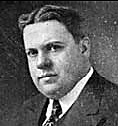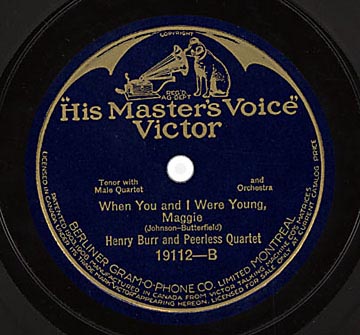Canadian Masters and their Works
Henry Burr – When You and I Were Young, Maggie – 1923 
Biography by Arthur Makosinski
 Since the birth of the phonograph, the name of Henry Burr (1885-1941) has been pasted on more records than any other artist. Arriving in New York City in the fall of 1902, the nineteen year old Harry McClaskey from Saint Stephen, New Brunswick, had both, a trained business acumen and a strong vocal background. With an operatic career in mind, he immediately started vocal studies and was soon appearing at small concerts throughout New York. Although recognized as a “phenomena” by his teachers and quickly absorbed into New York’s society, he found out that one could also make a buck in the new phonograph recording business. It was certainly more fun than singing at socials and in churches. Within a year, young McClaskey made his way into the offices of the principal record companies of the time; Columbia, Victor, and Edison. With his silvery tenor voice of rare sympathy and charm, ideally suited to the recording medium, he eventually secured recording contracts with all of them. In a move to preserve his reputation in the society, he recorded under an alias, usually as Henry Burr or Irving Gillette.
Since the birth of the phonograph, the name of Henry Burr (1885-1941) has been pasted on more records than any other artist. Arriving in New York City in the fall of 1902, the nineteen year old Harry McClaskey from Saint Stephen, New Brunswick, had both, a trained business acumen and a strong vocal background. With an operatic career in mind, he immediately started vocal studies and was soon appearing at small concerts throughout New York. Although recognized as a “phenomena” by his teachers and quickly absorbed into New York’s society, he found out that one could also make a buck in the new phonograph recording business. It was certainly more fun than singing at socials and in churches. Within a year, young McClaskey made his way into the offices of the principal record companies of the time; Columbia, Victor, and Edison. With his silvery tenor voice of rare sympathy and charm, ideally suited to the recording medium, he eventually secured recording contracts with all of them. In a move to preserve his reputation in the society, he recorded under an alias, usually as Henry Burr or Irving Gillette.
Recording in duets, quartets, and solos, McClaskey’s voice kept improving with each record. For the following ten years, while recording with far more experienced and usually older singers, McClaskey continued vocal training with New York’s very best teachers. Although he never achieved the desired goal of an operatic career, he didn’t have to as he conquered the hearts of millions with his tender and sincere renditions of the popular songs, specializing in simple, sentimental ballads, yet, unafraid to try new and experimental material.
By 1920, Harry recorded for just about every American and Canadian label and was at the top of his vocal and professional form having sold millions of records. A shrewd businessman and showman, he capitalized on his fame on records and transferred it to fame on stage. From 1916, he organized a troupe of seven other top Victor recording artists, and the eight, toured extensively throughout North America from Broadway to small towns in middle America, to large Canadian cities like Toronto, always to sell out audiences. Ever fond of his Maritime roots, he spent much time with his family in the Saint John area, and recorded several songs about Canada for Columbia and HMV in Montreal including the memorable “My Dear Old Canada.” In 1918, he had his first million selling, full price record with the tearful balled, “Just a Baby’s Prayer at Twilight.” A wonderful and melodic ballad that touched the hearts with its pathos “for her Daddy over there…”
With the approach of the jazz age in the mid twenties, McClaskey knew that his voice and singing style was not suitable for dance material, yet, he had some of his most memorable hits with the very danceable Irving Berlin’s “Always,” and “Are You Lonesome Tonight.” In 1928, when not even 50 years old, and at a point when his voice was at its most mellow and beautiful, Henry Burr lost his contract with Victor, and after a year of wandering between other record companies, left the recording business for good. Not that he was overly concerned. By that time Harry McClaskey, as Henry Burr was producing several radio shows for major networks, and in 1929 became an executive for the Columbia Broadcasting Corporation. Burr returned to the microphones in 1934 when he joined the immensely popular Barn Dance radio show broadcast from Chicago’s 50kw station, WLS. Here, he regained his old fame and popularity and soon became known as “ the best loved man in radio.” Henry Burr died on April 10, 1941, a couple of weeks following his last radio concert.
Burr’s own estimates of his recording output are at approximately12,000 recordings on various labels. Recent discographies list his total output in solos, duets, trios and quartets, at over 6,000 recording sides on 108 labels. Several of his favourite numbers however were recorded numerous times. This includes one of his most popular and steady sellers, “When You and I were Young Maggie,” included on this CD. The lyrics are by Canadian, George W. Johnson and music by James Austin Butterfield. Written in 1866, the song told a true story of young Maggie Clark, and her teacher, George W. Johnson, who courted her, and who wrote the poem as an expression of the lasting character of their love. The poem is visually correct, there was an actual mill on a creek near her home in Canada, where they regularly met. The couple married in 1865, and moved to Cleveland, Ohio, but their dream of a long romance did not come through, for Maggie died the same year.
Johnson, was a graduate of the University of Toronto and later obtained his Ph.D. at John Hopkins University in Baltimore. After Maggie’s death, Johnson returned to Canada and became a faculty member of the University of Toronto. The song became an instant hit when it was published in 1866 and continued to be decades later, when McClaskey revived it and recorded it over twenty times. The recordings were issued on at least 22 record labels in various forms and sizes. Between 1906 and 1923, McClaskey sang it as Henry Burr, Harry McClaskey, in a duet with Albert Campbell, with the Sterling Trio, and with the Peerless Quartet. It remained one of his most requested numbers at WLS.
“When You and I were Young Maggie,” is a worthy representative of his rich repertoire. McClaskey’s legacy of thousands of high quality recordings give us as clear a snapshot of love and life between 1902 and 1928, as no photograph ever could.
Excerpt from the first full biography the “Life and Times of Henry Burr” is scheduled to be published in 2007.

Links
http://www.collectionscanada.ca/gramophone/m2-1004-e.htm